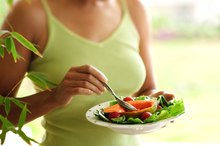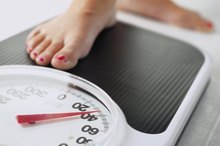How to Lose Belly Fat for Teen Girls
Some teen girls have a fast metabolism: They're able to eat anything they want and not gain a pound. On the other hand, some teenage girls struggle with their weight, and they look for effective ways to lose belly fat. There are several techniques to help teenagers reduce stomach bulge. With patience and willpower, these young ladies can achieve their ideal body image within a few weeks or months.
Cut back on sugary foods. Sugary treats like cake, cookies and ice cream can cause abdominal weight. Additionally, sodas and some juices contain several grams of sugar. Pay attention to food labels and eliminate or limit sugary foods and beverages from your diet.
Side Effects of Estrogen on Men
Learn More
Begin a workout routine. Set aside time to exercise. Work out for a minimum of 30 minutes daily. Effective exercises include walking, jogging, playing sports, biking or swimming.
Drink plenty of water. Drink at least eight to 10 glasses a day to lose belly fat. Water flushes excess sodium, sugar and fluids from your body.
What Hormones Are Responsible for Libido?
Learn More
Take a fiber supplement. Eat plenty of fruits and vegetables, or take a daily fiber supplement to promote digestive health and get rid of abdominal bloating.
Eliminate fatty foods from your diet. Stay away from high-fat foods, including fried foods and fast foods. Choose low-fat or no-fat alternatives.
Reduce your calorie intake. Eat smaller food portions and decrease your calorie intake by 500 per day. In other words, if you normally consume 1,900 calories a day, eat no more than 1,400. Do not go below 1,200 net calories a day--net calories are the number of calories you eat minus the number of calories you have burned exercising. Dropping below 1,200 calories may rob your body of the nutrients and energy it needs to run efficiently leaving you tired, weak and prone to illness and injury. Consult your health care provider regarding your personal caloric needs before you begin any weight loss program.
Eat organic. Many researchers believe that the added hormones in our food supply are contributing to the weight problem we are seeing in America. Switching to organic foods will help to eliminate some of the environmental hormones you are exposed to and may help to decrease your belly fat.
Warnings
Consult your health care provider before beginning any exercise and weight loss program. Many teenage girls can become overly worried or concerned about their appearance and body. Be reasonable with yourself and know that eating right, exercising, sleeping well and controlling stress and anxiety with good friends and family support will help you to grow into a healthy woman.
Related Articles
References
- A new predictive equation for resting energy expenditure in healthy individuals - PubMed
- Estimation of energy expenditure using prediction equations in overweight and obese adults: a systematic review - PubMed
- Validity of predictive equations to estimate RMR in females with varying BMI - PubMed
- Appendix 2. Estimated Calorie Needs per Day, by Age, Sex, and Physical Activity Level - 2015-2020 Dietary Guidelines | health.gov
- Protein intake and energy balance - PubMed
- Increased Dietary Protein as a Dietary Strategy to Prevent and/or Treat Obesity
- Effect of protein overfeeding on energy expenditure measured in a metabolic chamber - PubMed
- Dietary Protein and Energy Balance in Relation to Obesity and Co-morbidities - PubMed
- Effect of protein overfeeding on energy expenditure measured in a metabolic chamber - PubMed
- Presence or absence of carbohydrates and the proportion of fat in a high-protein diet affect appetite suppression but not energy expenditure in normal-weight human subjects fed in energy balance - PubMed
- Gluconeogenesis and energy expenditure after a high-protein, carbohydrate-free diet - PubMed
- A high-protein diet for reducing body fat: mechanisms and possible caveats
- A high-protein diet induces sustained reductions in appetite, ad libitum caloric intake, and body weight despite compensatory changes in diurnal plasma leptin and ghrelin concentrations - PubMed
- The effects of consuming frequent, higher protein meals on appetite and satiety during weight loss in overweight/obese men - PubMed
- Dietary Strategies for Weight Loss Maintenance - PubMed
- Dietary protein - its role in satiety, energetics, weight loss and health - PubMed
- High Compared with Moderate Protein Intake Reduces Adaptive Thermogenesis and Induces a Negative Energy Balance during Long-term Weight-Loss Maintenance in Participants with Prediabetes in the Postobese State: A PREVIEW Study - PubMed
- Effects of food form and timing of ingestion on appetite and energy intake in lean young adults and in young adults with obesity - PubMed
- Effects of fruit and vegetable, consumed in solid vs beverage forms, on acute and chronic appetitive responses in lean and obese adults - PubMed
- Sugar-sweetened beverages and weight gain in children and adults: a systematic review and meta-analysis - PubMed
- Resolved: there is sufficient scientific evidence that decreasing sugar-sweetened beverage consumption will reduce the prevalence of obesity and obesity-related diseases - PubMed
- Adverse metabolic effects of dietary fructose: results from the recent epidemiological, clinical, and mechanistic studies - PubMed
- Water-induced thermogenesis - PubMed
- Water drinking induces thermogenesis through osmosensitive mechanisms - PubMed
- Water-induced thermogenesis and fat oxidation: a reassessment - PubMed
- Immediate pre-meal water ingestion decreases voluntary food intake in lean young males - PubMed
- Water consumption increases weight loss during a hypocaloric diet intervention in middle-aged and older adults - PubMed
- Tea catechin and caffeine activate brown adipose tissue and increase cold-induced thermogenic capacity in humans - PubMed
- Caffeine enhances activity thermogenesis and energy expenditure in rats - PubMed
- The effects of caffeine intake on weight loss: a systematic review and dos-response meta-analysis of randomized controlled trials - PubMed
- Caffeine intake is related to successful weight loss maintenance - PubMed
- Preserving Healthy Muscle during Weight Loss
- Exercise acts as a drug; the pharmacological benefits of exercise - PubMed
- The essential role of exercise in the management of type 2 diabetes - PubMed
- A Systematic Review of Exercise Systematic Reviews in the Cancer Literature (2005-2017) - PubMed
- Benefits of exercise training on cardiovascular dysfunction: molecular and integrative - PubMed
- Exercise in the treatment of clinical anxiety in general practice - a systematic review and meta-analysis - PubMed
- The effects of a low-carbohydrate diet on appetite: A randomized controlled trial - PubMed
- Effects of low-carbohydrate and low-fat diets: a randomized trial - PubMed
- Effects of low-carbohydrate and low-fat diets: a randomized trial - PubMed
- Dietary Intervention for Overweight and Obese Adults: Comparison of Low-Carbohydrate and Low-Fat Diets. A Meta-Analysis - PubMed
- The Effects of a Low-Carbohydrate Diet vs. a Low-Fat Diet on Novel Cardiovascular Risk Factors: A Randomized Controlled Trial
- The Effect of Low-Carbohydrate Diet on Glycemic Control in Patients with Type 2 Diabetes Mellitus - PubMed
Warnings
- Consult your health care provider before beginning any exercise and weight loss program.
- Many teenage girls can become overly worried or concerned about their appearance and body. Be reasonable with yourself and know that eating right, exercising, sleeping well and controlling stress and anxiety with good friends and family support will help you to grow into a healthy woman.
Writer Bio
Valencia Higuera is a freelance writer from Chesapeake, Virginia. She has contributed content to print publications and online publications such as Sidestep.com, AOL Travel, Work.com and ABC Loan Guide. Higuera primarily works as a personal finance, travel and medical writer. She holds a Bachelor of Arts degree in English/journalism from Old Dominion University.









